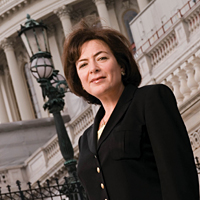| |
 |
| |
Photo
© James Kegley
Helen Teplitskaia '00 |
| |
|
Helen
Teplitskaia
EMBA grad
warms economic relationship of former cold war rivals
By
Matt Golosinski
At the Kellogg
School, it's not unusual for students and their professors
to exchange insights, each learning from the other. Faculty
give more than they get under these circumstances, yet the
dynamic is pronounced in the Kellogg Executive MBA program,
where the participants are accomplished professionals looking
to enhance their careers at the world's top-ranked EMBA program.
Still, Helen
Teplitskaia '00 may be unique among such Kellogg alumni.
While enrolled in the school's executive curriculum, she was
also an adjunct professor in the full-time MBA program, serving
as a faculty adviser for a Russian component of the Kellogg
Global Initiatives in Management course, which includes
two weeks of intensive field research abroad.
"I worked that
much harder to ensure my own grades remained high, since it
would be difficult to stand in front of my students otherwise,"
laughs Teplitskaia, a trade expert and native of St. Petersburg,
Russia, whose first Kellogg encounter came during a board
meeting in her home city where she met former Dean Donald
P. Jacobs.
The two connected,
sharing an interest in international business, which eventually
led to Teplitskaia's enrollment at Kellogg. "This meeting
changed my life," she says.
"Helen is a very
talented, hard-working person who has come an extraordinarily
long way with her grit and character," says Jacobs.
She credits the
Kellogg School with "empowering her to do anything." But in
truth, Teplitskaia, who today heads the Eurasian consultancy
at Imnex International, operating from both its Chicago and
Washington, D.C., offices, was already brimming with entrepreneurial
intensity that motivated her to tackle no less a task than
improving U.S.-Russian economic relations.
The impetus for
this effort came after participating in a World Bank conference
that she says ignored her homeland. "I was dismayed that ...
Russia was not on the agenda," she recalls. Her subsequent
investigations revealed that no bilateral chamber of commerce
existed at the time to facilitate business ties between the
two former Cold War rivals.
So Teplitskaia
figured she would start one.
"It was my second
year in the U.S. and, as na�ve as it sounds today, I simply
walked into the Illinois Secretary of State's office and hand-wrote
the application to form the American-Russian Chamber of Commerce
& Industry," she says.
Without any support
and seed funding, this "emotional move was destined to fail,"
but in 1992 Teplitskaia did muster the resources to create
the organization, which has since become a leader in fostering
trade, investment and technological cooperation.
Nevertheless, in
the 20 years since former Soviet leader Mikhail Gorbachev's
efforts at economic and cultural transparency (glasnost),
and the resultant economic restructuring (perestroika),
building bridges between America and Russia still presents
challenges. Witness the tensions that accompanied international
debate over the Iraq War, and in particular the initial U.S.
prohibitions against Russian investment in Iraq.
Cold War biases,
differences in the legal and tax environments and ignorance
about investment opportunities have been major obstacles to
overcome, says Teplitskaia, but "Russia has undoubtedly come
a long way in implementing economic reforms, creating a market
economy and building democracy."
Though she does
not believe in "pushing democracy on those not willing to
embrace it," Teplitskaia supports "encouraging and enlightening
people about how their lives will become better in a democratic
society."
She says Russia
has generally embraced the Western style of management and
turned away from a centralized government economy. "Young
generations of entrepreneurs are flourishing and many older
managers are going back to school to get advanced business
degrees," she notes, though bureaucracy still exists and many
Russians have found the transformation to free-market rules
difficult.
Teplitskaia herself
initially grappled with the cultural differences between Russia
and America. "It took years to understand and 'plug in,'"
she admits. "It was particularly hard to achieve results during
my first years in the U.S., when I did not know how to deal
with the 'old boys' network."
She credits the
Kellogg School with helping boost her confidence, build new
business alliances and "dramatically improve" her skills in
financial analysis, strategic development, international marketing
and team building.
She continues to
leverage these talents in her role as executive vice president
and head of Russia/Former Soviet Union practice at Imnex,
which provides strategic advice to companies looking to expand
their international presence.
Though globalization
has radically changed the rules of corporate engagement, not
all ventures are ready to thrive in international waters.
Russia presents a climate with unique hurdles, says Teplitskaia,
and misconceptions abound about how to tap this vast market.
"The typical misconception
is that 'what works in China should work in Russia,'" she
explains. In reality, the countries have very different histories
and cultures, and businesses must adapt accordingly. Geography,
infrastructure, education and population are all important
variables that influence strategy, Teplitskaia says.
"International
expansion is not a good idea when a company expects quick
profits with very little investment and limited commitment
to the region," she states.
Teplitskaia, though
admitting to being "no guru in women's issues," also has advice
for other female executives looking to overcome stereotypes
and expand their career options: Strive to be better than
the competition, no matter what their gender.
"Be innovative
and learn as much as possible about new trends, technologies
and interesting things. Stay flexible and optimistic," she
says.
Continue
to Stephanie Ruyle '02
Back
to Success Stories
|



